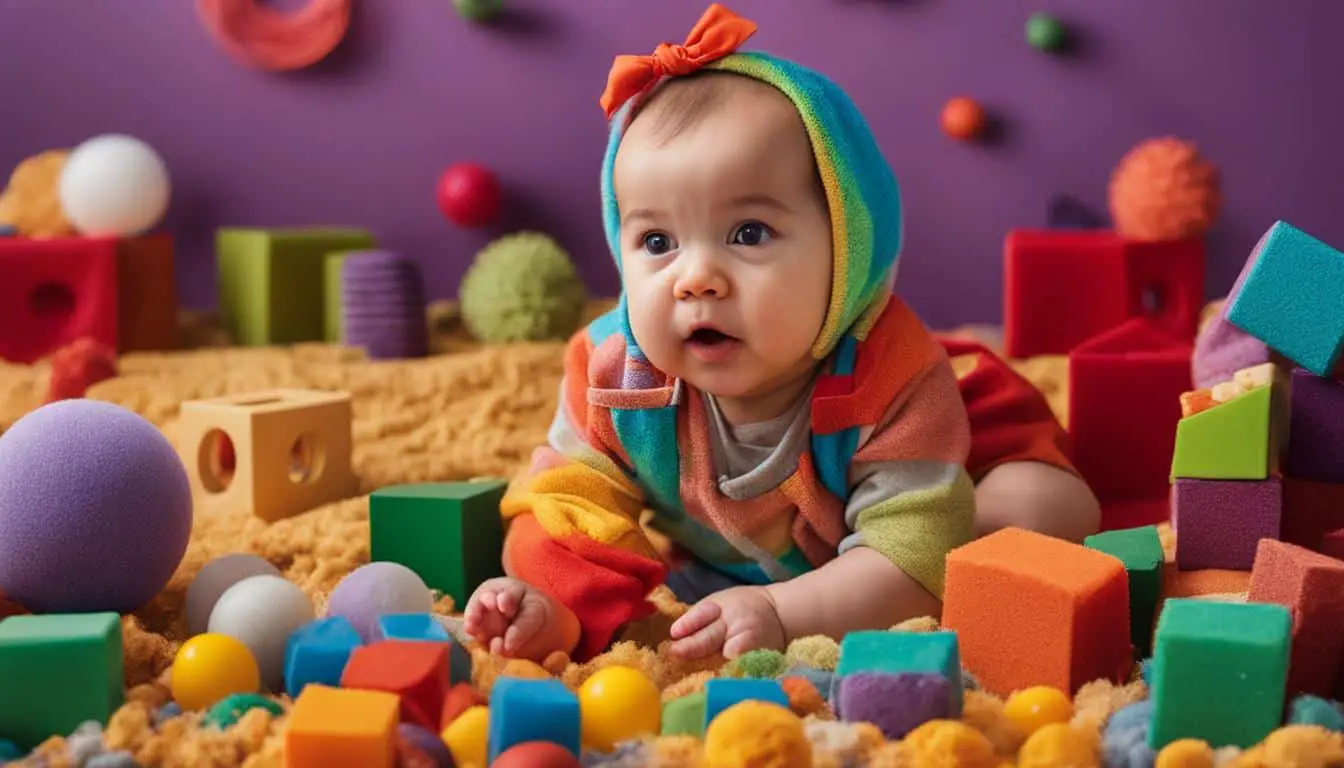Sensory Play Activities for Babies
When it comes to baby care and child development, incorporating sensory play activities into their routine is essential. Sensory play involves engaging babies’ five senses to stimulate their brain growth and promote overall development. By exploring different textures, tastes, smells, sounds, and visual stimuli, babies can enhance their fine and gross motor skills, language abilities, and cognitive functions. Not only does sensory play provide them with opportunities to discover their surroundings, but it also fosters social interaction and emotional skills.
Key Takeaways:
- Sensory play activities encourage babies’ brain development and help them explore their environment.
- Engaging babies’ senses through activities like taste tests of various fruits and listening to audio books has numerous benefits.
- Sensory play promotes the development of fine and gross motor skills, language skills, and cognitive abilities.
- It also fosters social interaction, emotional skills, and overall growth and development in babies.
- Babies can engage in sensory play activities such as balancing while walking and playing with moon sand.
Benefits of Sensory Play for Babies
Sensory play offers numerous benefits for the growth and development of babies. It plays a crucial role in helping them understand and interact with their environment, while also promoting various aspects of their overall well-being. By engaging in sensory play activities, babies are able to explore and experience different sensations, which aids in the development of their sensory perception and cognitive abilities.
One of the key advantages of sensory play is its positive impact on fine and gross motor skills. Through activities such as squeezing, grasping, and manipulating objects of various textures, babies enhance their hand-eye coordination and muscle strength. This, in turn, contributes to their overall physical development. Additionally, sensory play promotes language skills as babies are exposed to different sounds, words, and gestures while engaging in play. This helps them acquire and develop vocabulary, communication, and comprehension skills.
“Sensory play is not only beneficial for babies’ physical and cognitive development, but it also fosters their social and emotional growth.”
In terms of emotional and social development, sensory play encourages exploration and experimentation, which helps babies build confidence and self-esteem. It also provides opportunities for social interaction, whether with caregivers or other babies, fostering important social skills such as sharing, cooperation, and empathy. Moreover, sensory play allows babies to express their emotions and feelings through different sensory experiences, supporting their emotional well-being.
The Importance of Newborn Health and Baby Safety
When engaging in sensory play with babies, it is essential to prioritize their health and safety. Always ensure that the materials and objects used in sensory play are age-appropriate, non-toxic, and free from small parts that could pose a choking hazard. Additionally, closely supervise babies during playtime to prevent accidents or injuries. Maintaining a clean and hygienic play environment, regularly washing hands, and sanitizing toys and surfaces are also crucial in promoting newborn health.
| Table 1: Sensory Play Safety Tips |
|---|
| 1. Use age-appropriate materials and objects. |
| 2. Ensure that materials are non-toxic and free from small parts. |
| 3. Supervise babies closely during playtime. |
| 4. Maintain a clean and hygienic play environment. |
| 5. Regularly wash hands and sanitize toys and surfaces. |
In conclusion, sensory play offers a myriad of benefits for babies’ growth and development. Not only does it stimulate their senses and promote brain growth, but it also enhances their fine and gross motor skills, language skills, and cognitive abilities. Additionally, sensory play provides a platform for social interaction and emotional development. By engaging babies in sensory experiences, caregivers can support their overall well-being and create opportunities for learning, exploration, and bonding.
Sensory Play Activities for Infants and Toddlers
Sensory play activities are not only a fun way to keep infants and toddlers entertained, but they also play a crucial role in their growth and development. Engaging their senses through play helps stimulate brain activity and promotes the development of fine and gross motor skills, cognitive abilities, and language skills.
For infants aged 6-12 months, a few simple yet effective sensory play ideas can be implemented. String lights in a box can provide visual stimulation and captivate their attention. Creating sensory baskets with objects of different textures allows them to explore and discover various tactile sensations. Introducing Jello or edible baby sand can provide interesting tactile experiences. Temperature exploration with ice cubes and water bottles can also be intriguing for them.
As toddlers grow, their sensory play activities can expand to include more complex experiences. Smell and guess games can be introduced to enhance their olfactory senses. Engaging in pretend tightrope walking can help develop balance, coordination, and gross motor skills. Salt tray writing offers both tactile and visual stimulation. Exploring edible and taste-safe sensory bases like oat sensory bins and cereal safaris can further enhance their sensory perception.
Engaging in these sensory play activities not only helps infants and toddlers develop their senses and motor skills, but it also provides valuable bonding and learning opportunities with their caregivers. These activities can be incorporated into their daily routines to create a nurturing and stimulating environment. Remember to always ensure a safe and supervised play area and use age-appropriate materials to make their sensory play experiences enjoyable and beneficial.
FAQ
Why is sensory play important for babies’ development?
Sensory play is crucial for babies’ development as it stimulates their senses, promotes brain growth, and enhances the development of fine and gross motor skills, language skills, and cognitive abilities.
What are the benefits of sensory play for babies?
Sensory play has numerous benefits, including building nerve connections in the brain, fostering social interaction and emotional skills, and enhancing overall development.
Can you provide some examples of sensory play activities for babies?
Yes, some examples of sensory play activities for babies include balancing while walking, moon sand play, taste tests of various fruits, and listening to audio books.
How does sensory play aid in babies’ exploration and learning?
Sensory play allows babies to explore their environment, learn about the world around them, and develop their sensory perception by experiencing different textures, tastes, smells, and sounds.
What are some sensory play activities suitable for infants and toddlers?
For infants aged 6-12 months, activity ideas include using string lights in a box for visual stimulation, creating sensory baskets with objects of different textures, exploring Jello and edible baby sand for tactile experiences, and engaging in temperature exploration with ice cubes and water bottles. For toddlers aged 9 months and older, sensory play can involve smell and guess games, pretend tightrope walking for balance development, salt tray writing for tactile and visual stimulation, and exploring edible and taste-safe sensory bases like oat sensory bins and cereal safaris.






